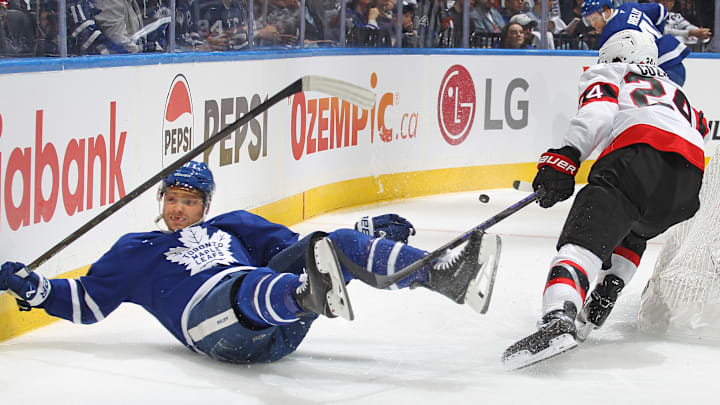The 2025-26 Toronto Maple Leafs season is coming fast but before the games truly matter, we at Editor In Leaf are taking a look at one player everyday until the puck is dropped, and what we could expect from them this time around.
In a different universe, perhaps one where he didn't have a hockey-famous last name, Max Domi would be the exact sort of player traditionalists would criticize constantly.
Domi gets less heat for poor defense and a self-destructive temper than he arguably deserves, but the Toronto Maple Leafs still likely expect a better version of him next season.
Some disappointment in second Leafs season
During his debut season with Toronto, Domi generated 47 points, a total that climbs from mediocre to fairly impressive when you consider his modest ice time (less than 14 minutes per game). With similar ice time, Domi slipped to 33 points during the 2024-25 campaign.
His second playoff run with the Leafs ranked as a mixed bag. His Game 2 overtime-winner against the Senators showed some of the gamebreaking potential he still has.
The Panthers series magnified some of his warts, as he struggled at times to carry play and took some boneheaded penalties.
For a somewhat slow and largely aging Maple Leafs team, Domi's speed is an asset -- especially when he's focused on going somewhere fast, rather than nowhere. Combine those wheels with considerable passing ability and you can argue that the good outweighs the bad, especially with a $3.75 million cap hit that doesn't break the bank.
He didn't exactly silence doubters, and there are times when he hovers dangerously toward being a genuine net-negative for his teams.
Shooooot?
Craig Berube told Jonas Siegel of The Athletic that he wants Domi to adopt a different mindset in 2025-26.
Berube signaled out the playmaker's pass-first (and maybe second and third?) tendencies. On one hand, that's understandable, as the left-winger has been limited to eight and nine goals through two Toronto seasons.
Looking at recent history, it would be wise to keep expectations modest. Since 2019-20, Domi only cracked 20 goals once, reaching that exact mark in 2022-23. It doesn't seem like a hyper-selective, Alex Tanguay-style deal, either; his shooting percentage is a languid 7.4-percent with Toronto, and an uninspiring 9.8-percent for his 10-year career.
Maybe he's just being pragmatic.
That said, other parts of his game make you wonder about his decision-making.
In an ideal world, he'd find a better balance between his hit-or-miss offense and his routinely leaky defense. Realistically, at 30 years old, the Leafs are better off sheltering him and merely hoping for incremental improvements.
A flaw that deserves more ire
A lot of old-school hockey types revel in seeing a fiery, nasty player, yet savvy observers ask a key question. Is there a function to the fury?
The sweet spot between old-school and analytics is for a ferocious forechecker to tilt the ice in their team's favor. A mix of physicality and smart positioning could create lucrative turnovers. More subtly, functional nastiness could exhaust opponents, whether that means throughout a grueling series or even just setting up an advantageous shift for the next line change.
Far too often, all Domi's rage sticks him in a penalty box cage, and his team on an unnecessary penalty kill.
During his two Leafs seasons, Domi took 31 more penalties than he drew, with only Ryan Strome (-35) netting a worse deferential among forwards. That also ties him for eighth-worst among all NHL skaters.
That style of play is a necessary evil for a defensive defenseman who simply isn't going to jump into the attack all of that often. You could make the case for a forward who specializes in protecting the middle of the ice in their own zone, maybe.
Those bad habits add an extra helping of frustration to Domi's dismal defense, and can make him that much more grating if you believe that he subsists largely off of "low-calorie offense."
Ideally, a hard-nosed coach such as Berube would build up Domi's two-way game to a more beneficial level, whether that means improving own-zone habits or better outscoring problems.
Shouldn't a disciplinarian do a better job managing the self-destructive elements of a player's volatile emotions, though? Bad penalties are the sort of thing that gets a rookie benched or possibly forces a player with less skill and pedigree out of the NHL.
It's more than reasonable to ask a veteran player to clean up a dirty part of their game that hurts their own team more often than it goads opponents into making mistakes.
